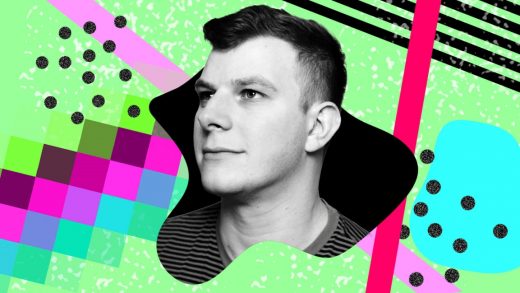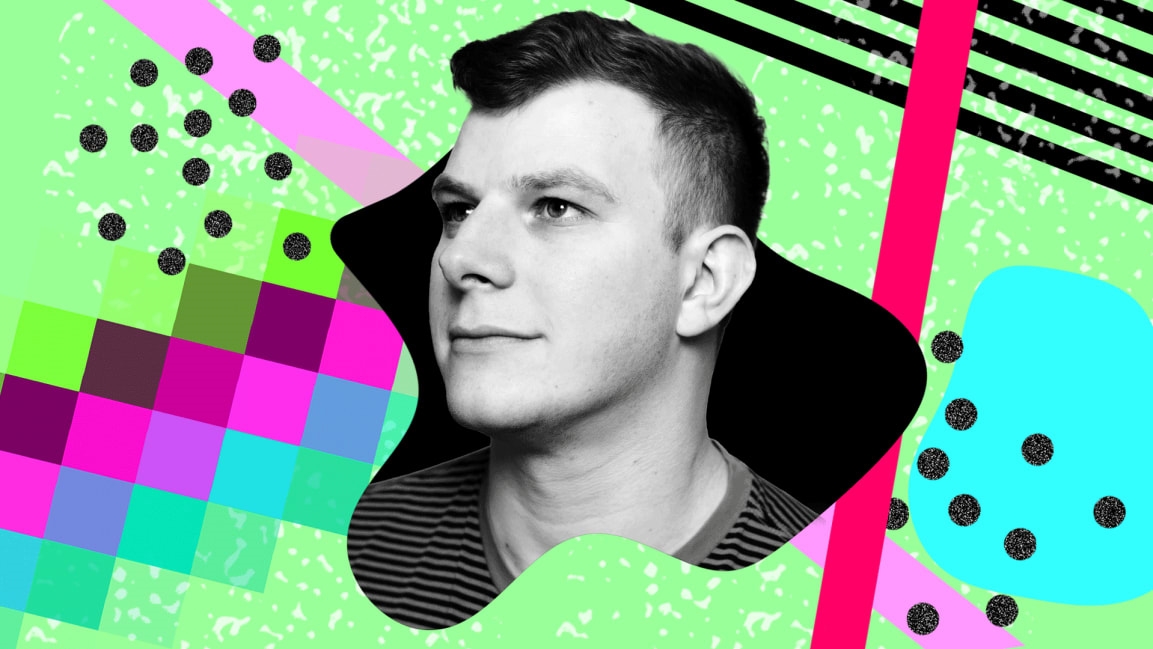What happens after you blow up on TikTok? Comedian Kyle Gordon is figuring it out
It all started with enchiladas.
When the pandemic hit last year, New York-based comedian Kyle Gordon joined TikTok as a way of having a creative outlet. But after a few half-baked ideas that didn’t really catch on, he took a break from the platform until Thanksgiving.
“I went home and I was just feeling very unfulfilled and lazy,” Gordon says. “So I came back from Thanksgiving and I set this goal to post one TikTok everyday for three months. I posted the first one on November 30th and that kind of blew up.”
It wasn’t a video of Gordon glomming onto an existing trend or dance. It was him acting like an overly excited kid with news that he was bursting to share: his uncle made enchiladas for him and his brother Sam.
@kylegordonisgreat You’ll never guess what I just found out! #fyp #foryou #greatnews #breakingnews
“The very first one was a total fluke—it was really stupid,” Gordon says. “I had never blown up on anything, ever, in any way, shape, or form. I posted it literally just to figure out how the app works again. I came back to my girlfriend’s house after a whole day and I was like, ‘Oh my God.’”
Since Gordon’s first viral post, he’s amassed 1.8 million followers on TikTok with 56.9 million likes on his videos. On Instagram, his second most-popular platform, he has 21,700 followers.
“The fact that someone like me could blow up overnight with no following is pretty unique to TikTok compared to other apps,” Gordon says. “I’ve been on Twitter forever and I’ve never blown up there once.” (He has just 527 followers on Twitter.)
Gordon has built his following with a rotating cast of skits and characters, most notably “the kid that’s no fun,” a take on that incessantly rule-abiding brat who was forever the thorn of your childhood. Popular recurring characters like that are usually guaranteed to pull in a decent amount of views. But for Gordon’s other content, he hasn’t figured out a formula for consistent success.
“I had a whole series of baseball [parodies] that did really well, and that was surprising to me. What I thought was niche turned out to not be so niche,” he says. “And then I had another one that was like an Eat, Pray, Love parody of a white woman finding herself. I thought that was super accessible and it didn’t do as well. So I’m always surprised to a certain extent.”
@kylegordonisgreat #fyp #foryou #foryoupage #spoiledbrat #spoiledkid #richkid #annoyingfriend #littlebrother #tween #littleboy #kidtok #spoiled #spoiledkids
TikTok’s For You page, the algorithmic stream of videos based on prior engagement, has become prime real estate of discoverability for creators—and a point of mystery until recently. Last year, TikTok released insights into how its recommendations work, including such data points as how much of a video you watched, did you like or leave a comment, and what hashtags, captions, and sounds creators used.
Many creators, though, often try to game the algorithm by adding hashtags related to a movie release, major brand campaign, or a big cultural event like the Oscars—even if their video has nothing to do with any of that—as a way to get their videos in circulation. “I have no idea what I’m doing with hashtags,” Gordon admits. “I just kind of put words and phrases that seem popular and somewhat relevant to what the content of the video is. When I see [hashtags in other creators’s videos], I’m like, what am I missing? Am I being an idiot by not hashtagging Tostitos?”
In a way, Gordon’s organic approach to building a following is a rarity on a platform designed for capitalizing on trends and attaching your content to existing content through duets and stitches.
“It seems maybe that my path has maybe been a little different than the average path, because really, from the bottom of my heart, what I post is just a pure extension of my own voice and what I think is funny. I don’t do any trends. I hardly ever use music, let alone trending music. People very infrequently stitch or duet my content,” Gordon says. “In that way, I love it because I’ve been able to build an audience just doing what I think is funny for myself.”
And he’s been able to fully support himself from it, too.
@kylegordonisgreat #fyp #foryou #foryoupage #baseball #baseballboys #baseballtiktoks #baseballgirls #baseballseason #baseballforlife #baseballfield #baseballlife #movie
“I’ve been lucky. I now no longer have another job,” he says. “But I’m not raking it in! I still have two roommates and live in a tiny room. It’s so funny because people in the comments think I’m a rich celebrity.”
Gordon has been able to go full-time through merch sales, brand endorsements, and doing Cameos—and, interestingly enough, not through TikTok’s Creator Fund, TikTok’s financial resource created as a response to not having direct ad revenue for creators like YouTube does.
Gordon did, in fact, join the Creator Fund at one point, only to quit after just three hours. “Before I reached a million followers, I was obviously intrigued about the possibility of making money off my videos. But everything I read said that there’s a possibility that your views could decrease for whatever reason,” he says. “I joined for literally three hours. I posted a video, and it did terribly. Then I left, and it started to do well. That’s anecdotal. It’s not the most scientific thing in the world, but we never hear from TikTok.”
Gordon isn’t the only creator who’s complained of the same thing. However, TikTok refutes any decrease in activity after joining the Creator Fund, stating in a blog post:
Joining the Creator Fund will not have a negative impact on your TikTok videos views or followers, any drops in video views are caused by in-app fluctuations that naturally occur and have nothing to do with the Creator Fund. But we will continue to keep a close eye on this and are always listening to the feedback we receive from our creator community.
However, Gordon is still wary.
“I can’t risk possibly affecting the the growth of my account,” he says. “My end goal is TV and other things; it’s not to forever be making all my money on TikTok. So the growth of my account is important to me.”
What also has the ability to hinder Gordon’s growth is what he believes is TikTok’s hyper aggressive content moderation guidelines.
“It’s very frustrating,” Gordon says. “I understand where they’re coming from because they’re targeting parents by saying, ‘Don’t worry about content you don’t want your kids seeing, ’cause we’re going to take everything down.’”
Gordon once did a series where he told embarrassing stories of his childhood, like how he used to pee his pants all the time. “They took that down for bullying, but I was bullying myself!” He says. “It’s not the biggest deal, because, again, I understand where they’re coming from. And there’s a lot of chaos everywhere online. I create new content every day, so at this point I’m like, all right, onto the next one.”
As the world continues to test the waters of opening up during the pandemic, Gordon is curious to see if his popularity online will translate to his original home for comedy: live shows.
“I would love to go on tour sometime in the future,” he says. “One, it would just be fun. Two, it would be a good step in my career. And three, secretly, there is a little part of me that wants to show that I was a comedian first. So being able to show people that I can put on a live show is important to me.”
(49)



